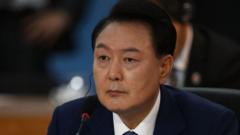South Korean President Yoon Suk Yeol has caused a significant stir with his recent declaration of martial law, which he insists was necessary to safeguard democracy. In a surprising televised address last Thursday, Yoon characterized his move as a legal measure to "prevent the collapse" of democratic order and to confront what he termed the opposition's "parliamentary dictatorship." He expressed his determination not to resign before an impending impeachment vote scheduled for Saturday, asserting, "I will fight to the end."
Yoon's grip on power has weakened, with investigations into insurrection charges against him and key allies, leading to travel bans for several officials. The political landscape has turned contentious as the opposition-led parliament swiftly moved to impeach police chief Cho Ji-ho and justice minister Park Sung-jae. The impeachment process for officials is notably less stringent than that for the president, requiring only 150 votes in South Korea's 300-member National Assembly.
Despite the mounting pressure, Yoon disputed claims that his martial law order was tantamount to insurrection. He accused his political rivals of propagating "false incitement" aimed at his downfall, maintaining that the opposition poses a genuine threat to public safety and democracy. Yoon has stated he would accept his "legal and political responsibilities."
For context, last Saturday's effort by opposition lawmakers to remove Yoon from office was thwarted, as members of his own ruling People Power Party (PPP) chose not to participate in the vote. This prompted the opposition to announce their commitment to schedule impeachment votes weekly until Yoon is ousted. The PPP’s floor leader, Choo Kyung-ho, stepped down after the failed attempt, with Kwon Seong-dong, a Yoon loyalist, stepping in as his successor. Kwon hinted at encouraging party discussions around the ongoing impeachment process.
Yoon's administration has found itself significantly impaired following the opposition's landslide victory in the April general elections, further diminishing its legislative capabilities and fostering an environment of instability. He alleged that sympathizers of North Korea are undermining his administration, linking these sentiments to his hasty declaration of martial law on December 3.
The initial announcement of martial law incited widespread public unrest, leading to confrontational protests at the National Assembly as lawmakers moved to rescind Yoon's decree. Ultimately, he withdrew the order within hours, yet political anxiety persisted across the nation. Calls for Yoon's impeachment have reached fever pitch, accompanied by significant protests, strikes, and instability within his inner circle. Notably, ex-defense minister Kim Yong-hyun, whose actions contributed to the martial law tensions, has recently faced personal crisis while detained.
As South Korea braces for the coming impeachment vote, the future of President Yoon Suk Yeol remains precariously balanced amid a backdrop of political chaos and public dissent.
Yoon's grip on power has weakened, with investigations into insurrection charges against him and key allies, leading to travel bans for several officials. The political landscape has turned contentious as the opposition-led parliament swiftly moved to impeach police chief Cho Ji-ho and justice minister Park Sung-jae. The impeachment process for officials is notably less stringent than that for the president, requiring only 150 votes in South Korea's 300-member National Assembly.
Despite the mounting pressure, Yoon disputed claims that his martial law order was tantamount to insurrection. He accused his political rivals of propagating "false incitement" aimed at his downfall, maintaining that the opposition poses a genuine threat to public safety and democracy. Yoon has stated he would accept his "legal and political responsibilities."
For context, last Saturday's effort by opposition lawmakers to remove Yoon from office was thwarted, as members of his own ruling People Power Party (PPP) chose not to participate in the vote. This prompted the opposition to announce their commitment to schedule impeachment votes weekly until Yoon is ousted. The PPP’s floor leader, Choo Kyung-ho, stepped down after the failed attempt, with Kwon Seong-dong, a Yoon loyalist, stepping in as his successor. Kwon hinted at encouraging party discussions around the ongoing impeachment process.
Yoon's administration has found itself significantly impaired following the opposition's landslide victory in the April general elections, further diminishing its legislative capabilities and fostering an environment of instability. He alleged that sympathizers of North Korea are undermining his administration, linking these sentiments to his hasty declaration of martial law on December 3.
The initial announcement of martial law incited widespread public unrest, leading to confrontational protests at the National Assembly as lawmakers moved to rescind Yoon's decree. Ultimately, he withdrew the order within hours, yet political anxiety persisted across the nation. Calls for Yoon's impeachment have reached fever pitch, accompanied by significant protests, strikes, and instability within his inner circle. Notably, ex-defense minister Kim Yong-hyun, whose actions contributed to the martial law tensions, has recently faced personal crisis while detained.
As South Korea braces for the coming impeachment vote, the future of President Yoon Suk Yeol remains precariously balanced amid a backdrop of political chaos and public dissent.






















